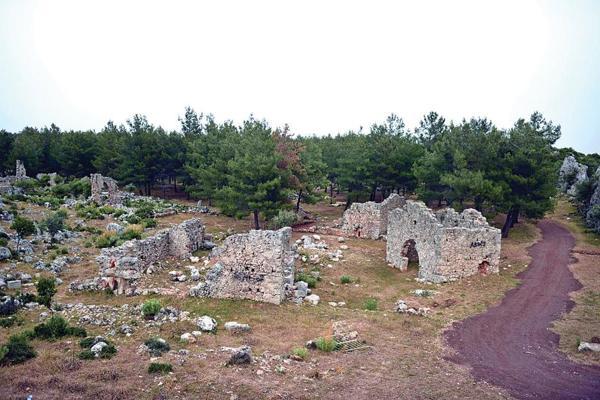Antalya’s Lyrboton Kome ready to open to visitors
ANTAKYA – DHA


The 2,200-year-old ancient city of Lyrboton Kome in the southern province of Antalya, a stone’s throw away from contemporary life, is ready to host visitors.
Despite being the closest ancient city to central Antalya, the settlement in Varsak neighborhood was undiscovered until four years ago. But the ancient city is now widely known due to excavations carried out by the Kepez Municipality.
Archaeological works carried out in collaboration with the Antalya Museum and Akdeniz University in Lyrboton Kome, which has always been a site of mass olive oil production in the ancient city of Perge, recently ended.
The works were carried out around the main road of the ancient city, olive oil shops, Roman-era bath ruins, Byzantine-era churches, residences, Arete Tower area and water cisterns.
Antalya will have an archaeology park for the first time, and a walking route amid the ruins of the ancient settlement will open to visitors in the first stage.
Municipality teams have covered the walking route with red earth and widened the road for vehicles in the ancient city.
Information signboards were also placed around the walking route. Visitors will be able to see ruins dating back to 2,200 years while walking on the pine tree-lined route.
Kepez Mayor Hakan Tütüncü, who played a great role in unearthing the ancient settlement, said the ancient city will open in the coming days. “The historic city was first cleared from plants. Then excavations were initiated. It was the first stage of the works. Now in the second stage we have opened the walking route. Visitors will see our project in this route as well as the historic structures. The ancient city offers an extraordinary view of Antalya to visitors. It will be a place for those who want to watch the sun set and rise and take photos,” he added.
Tütüncü said they also plan to set up an olive museum.
“Some certain structures will be revived in the ancient city and equipped with the same functions they had in the past, like the Roman market, Roman house or Roman bakery. This city has been involved in olive oil production for 2,200 years. We will show it to people in an olive oil museum. Lyrboton Kome will become a history and nature park with its museums, plants, geological structures and walking routes,” he added.
Lyrboton Kome, the city of olives
The ancient settlement is located on a hill in Varsak, which overlooks the Mediterranean Sea and has a view of the Bey Mountains. The historical city, from where the sunrise and sunset can be watched, was built on 452,000 square meters of land.
Lyrboton Kome hosts civilian houses that were used during and after the Roman period, a large number of olive oil ateliers and integration systems, a Roman bath, four churches and chapels and a water cistern carved into over 100 big and small rocks. The world’s oldest foundation inscription on olives and olive grove conservation is also in Lyrboton Kome.
